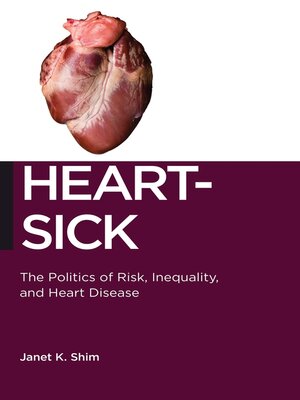Heart-Sick
ebook ∣ The Politics of Risk, Inequality, and Heart Disease · Biopolitics
By Janet K. Shim

Sign up to save your library
With an OverDrive account, you can save your favorite libraries for at-a-glance information about availability. Find out more about OverDrive accounts.
Find this title in Libby, the library reading app by OverDrive.



Search for a digital library with this title
Title found at these libraries:
| Library Name | Distance |
|---|---|
| Loading... |
Heart disease, the leading cause of death in the United States, affects people from all walks of life, yet who lives and who dies from heart disease still depends on race, class, and gender. While scientists and clinicians understand and treat heart disease more effectively than ever before, and industrialized countries have made substantial investments in research and treatment over the past six decades, patterns of inequality persist. In Heart-Sick, Janet K. Shim argues that official accounts of cardiovascular health inequalities are unconvincing and inadequate, and that clinical and public health interventions grounded in these accounts ignore many critical causes of those inequalities.
Examining the routine activities of epidemiology—grant applications, data collection, representations of research findings, and post-publication discussions of the interpretations and implications of study results—Shim shows how social differences of race, social class, and gender are upheld by the scientific community. She argues that such sites of expert knowledge routinely, yet often invisibly, make claims about how biological and cultural differences matter—claims that differ substantially from the lived experiences of individuals who themselves suffer from health problems. Based on firsthand research at epidemiologic conferences, conversations with epidemiologists, and in-depth interviews with people of color who live with heart disease, Shim explores how both scientists and lay people define "difference" and its consequences for health. Ultimately, Heart-Sick explores the deep rifts regarding the meanings and consequences of social difference for heart disease, and the changes that would be required to generate more convincing accounts of the significance of inequality for health and well-being.







